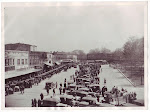Special Counsel Robert S. Mueller, III (photo Wikipedia, Fair Use Rights for non-profit news reporting and commentary)
Report On The Investigation Into Russian Interference In The 2016 Presidential Election - Redacted Version
Security Classification Removed by Issuing Authority
U.S. Department of Justice
Report Submitted Pursuant to 28 C.F.R. § 600.8(c)
CNN Page Link to report: https://www.cnn.com/2019/04/18/politics/full-mueller-report-pdf/index.html
VOLUME 1 - Conclusive Statement - "[The] report provides detailed explanations of the Office's charging decisions, which contain three main components.
First, the Office determined that Russia's two principal interference operations in the 2016 U.S. presidential election-the social media campaign and the hacking-and-dumping operations violated U.S. criminal law. Many of the individuals and entities involved in the social media campaign have been charged with participating in a conspiracy to defraud the United States by undermining through deceptive acts the work of federal agencies charged with regulating foreign influence in U.S. elections, as well as related counts of identity theft . See United States v. Internet Research Agency, et al., No. 18-cr-32 (D.D.C.). Separately, Russian intelligence officers who carried out the hacking into Democratic Party computers and the personal email accounts of individuals affiliated with the Clinton Campaign conspired to violate , among other federal laws, the federal computer-intrusion statute, and the have been so char ed. See United States v. Ne ksho, et al., No. 18-cr-215 D.D.C ." Harm to ongoing matter and Personal Privacy - Approximately 4 lines Redacted.
Second, while the investigation identified numerous links between individuals with ties to the Russian government and individuals associated with the Trump Campaign, the evidence was not sufficient to support criminal charges. Among other things, the evidence was not sufficient to charge any Campaign official as an unregistered agent of the Russian government or other Russian principal. And our evidence about the June 9, 2016 meeting and WikiLeaks's releases of hacked materials was not sufficient to charge a criminal campaign-finance violation. Further, the evidence was not sufficient to charge that any member of the Trump Campaign conspired with representatives of the Russian government to interfere in the 2016 election.
Third, the investigation established that several individuals affiliated with the Trump Campaign lied to the Office, and to Congress, about their interactions with Russian-affiliated individuals and related matters. Those lies materially impaired the investigation of Russian election interference. The Office charged some of those lies as violations of the federal false statements statute. Former National Security Advisor Michael Flynn pleaded guilty to lying about his interactions with Russian Ambassador Kislyak during the transition period. George Papadopoulos, a foreign policy advisor during the campaign period , pleaded guilty to lying to investigators about, inter alia, the nature and timing of his interactions with Joseph Mifsud, the professor who told Papadopoulos that the Russians had dirt on candidate Clinton .in the form of thousands of emails. Former Trump Organization attorney Michael Cohen pleaded guilty to making false statements to Congress about the Trump Moscow Project Approximately 3 lines Redacted Harm to Ongoing Matter And in February 2019, the U.S. District Court for the District of Columbia found that Manafort lied to the Office and the grand jury concerning his interactions and communications with Konstantin Kilimnik about Trump Campaign polling data and a peace plan for Ukraine.
The Office investigated several other events that have been publicly reported to involve potential Russia-related contacts. For example, the investigation established that interactions between Russian Ambassador Kislyak and Trump Campaign officials both at the candidate's April 2016 foreign policy speech in Washington, D.C., and during the week of the Republican National Convention were brief, public, and non-substantive. And the investigation did not establish that one Campaign official's efforts to dilute a portion of the Republican Party platform on providing assistance to Ukraine were undertaken at the behest of candidate Trump or Russia. The investigation also did not establish that a meeting between Kislyak and Sessions in September 2016 at Sessions's Senate office included any more than a passing mention of the presidential campaign.
The investigation did not always yield admissible information or testimony, or a complete picture of the activities undertaken by subjects of the investigation. Some individuals invoked their Fifth Amendment right against compelled self-incrimination and were not, in the Office 's judgment, appropriate candidates for grants of immunity. The Office limited its pursuit of other witnesses and information-such as information known to attorneys or individuals claiming to be members of the media-in light of internal Department of Justice policies. See, e.g., Justice Manual§§ 9-13.400, 13.410. Some of the information obtained via court process, moreover, was presumptively covered by legal privilege and was screened from investigators by a filter ( or "taint") team. Even when individuals testified or agreed to be interviewed, they sometimes provided information that was false or incomplete, leading to some of the false-statements charges described above. And the Office faced practical limits on its ability to access relevant evidence as well-numerous witnesses and subjects lived abroad, and documents were held outside the United States.
Further, the Office learned that some of the individuals we interviewed or whose conduct we investigated-including some associated with the Trump Campaign---deleted relevant communications or communicated during the relevant period using applications that feature encryption or that do not provide for long-term retention of data or communications records. In such cases, the Office was not able to corroborate witness statements through comparison to contemporaneous communications or fully question witnesses about statements that appeared inconsistent with other known facts.
Accordingly, while this report embodies factual and legal determinations that the Office believes to be accurate and complete to the greatest extent possible, given these identified gaps, the Office cannot rule out the possibility that the unavailable information would shed additional light on (or cast in a new light) the events described in the report.
VOLUME 2 - Obstruction of Justice - Conclusive Statement: "[If] we had confidence after a thorough investigation of the facts that the President clearly did not commit obstruction of justice , we would so state. Based on the facts and the applicable legal standards , however , we are unable to reach that judgment. The evidence we obtained about the President 's actions and intent presents difficult issues that prevent us from conclusively determining that no criminal conduct occurred. Accordingly, while this report does not conclude that the President committed a crime, it also does not exonerate him."















No comments:
Post a Comment